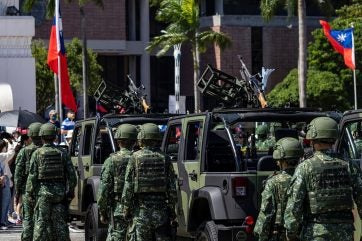
In a move likely to escalate tensions with Beijing, the United States has authorised the sale of military equipment to Taiwan, potentially drawing criticism from China while emphasising Washington’s commitment to Taiwan’s security.
Amidst growing geopolitical tensions in the region, the United States has approved a Foreign Military Sale to the Taipei Economic and Cultural Representative Office in the United States worth $75m. The sale includes the Taiwan Advanced Tactical Data Link System Upgrade Planning and related equipment and support services.
The decision, announced by the Defense Security Cooperation Agency, shows Washington’s commitment to Taiwan’s defence and security but is likely to provoke reactions from Beijing, which considers Taiwan a renegade province. The move comes during heightened military manoeuvres by China in the Taiwan Strait and increased pressure on the self-governing island.
The threat of a Chinese invasion of Taiwan is currently an issue of concern for the US, per GlobalData’s intelligence on the US defence market.
The US and the Philippines jointly conducted military patrols over the South China Sea to counter Chinese aggression and assert regional stability. The patrols, involving air and naval forces, coincided with heightened tensions following Chinese coastguard vessels’ recent altercation with a Filipino outpost.
The proposed sale includes Cross Domain Solutions, High Assurance devices, Global Positioning System receivers, communications equipment, and technical services to enhance Taiwan’s ability to modernise its armed forces and maintain a credible defensive capability. According to the State Department, the sale aligns with US law and policy, supporting Taiwan’s efforts to counter current and future threats in the region.
While the US asserts that the sale will not alter the military balance in the region, China has consistently opposed arms sales to Taiwan, viewing them as interference in its internal affairs. Beijing has warned of severe consequences and has called on Washington to adhere to the “One China” principle, which considers Taiwan an inseparable part of Chinese territory.
At the beginning of the new year, China announced sanctions on five defence firms over weapons sales to Taiwan. Despite this, the US Department of Defense awarded a contract modification to Raytheon a month later, awarding the production and delivery of 50 Joint Standoff Weapon (JSOW) air-to-surface missiles for Taiwan, worth $68.4m.
The approval of the sale shows the Biden administration’s commitment to strengthening ties with Taiwan, a strategically important partner. However, it also risks further exacerbating tensions between the world’s two largest economies, adding to friction over trade, human rights, and territorial disputes.
As the sale progresses, questions remain about its potential impact on regional stability and the broader US-China relationship. With both sides increasingly flexing their military muscles, the sale of military technology to Taiwan is likely to be met with opposition from Beijing, raising concerns about the risk of escalation and the prospects for peaceful resolution of longstanding disputes in the region.




